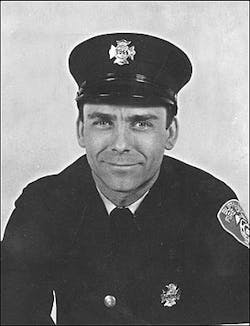ORCHARD PARK, New York (AP) -- Nearly 9 1/2 years after a firefighter was left brain-damaged and mostly mute during a 1995 roof collapse, he did something that shocked his family and doctors: He asked for his wife.
Staff members of the nursing home where Donald Herbert has lived for more than seven years raced to get Linda Herbert on the telephone.
It was the first of many conversations the patient had with his wife, four sons and other family and friends Saturday during a 14-hour stretch, Herbert's uncle Simon Manka said.
''How long have I been away?'' Herbert asked.
''We told him almost 10 years,'' the uncle said. ''He thought it was only three months.''
Herbert, who will turn 44 Saturday, was fighting a house fire Dec. 29, 1995, when the roof collapsed, burying him under debris. After going without air for several minutes, Herbert was comatose for 2? months and has undergone therapy ever since.
News accounts in the days and years after his injury describe Herbert as blind and with little, if any, memory. Video shows him receiving physical therapy but apparently unable to communicate and with little awareness of his surroundings.
Manka declined Monday to discuss his nephew's current condition, or whether the apparent progress was continuing this week. The family was seeking privacy while doctors evaluated Herbert, he said.
''He's resting comfortably,'' the uncle said.
As word of Herbert's progress spread, a steady stream of visitors arrived at the Father Baker Manor nursing home in this Buffalo suburb.
''He stayed up 'til early morning talking with his boys and catching up on what they've been doing over the last several years,'' firefighter Anthony Liberatore told WIVB-TV.
Herbert's sons were 14, 13, 11 and 3 when he was injured.
Staff members at the nursing facility recognized the change in Herbert, Manka said, when they heard him speaking and ''making specific requests.''
''The word of the day was 'amazing,''' he said.
Dr. Rose Lynn Sherr of New York University Medical Center said when patients recover from brain injuries, they usually do so within two or three years.
''It's almost unheard of after 10 years,'' she said, ''but sometimes things do happen and people suddenly improve and we don't understand why.''
Manka said visitors let Herbert set the pace of the conversations and did not bring up the fire in which he was injured.
''The extent and duration of his recovery is not known at this time,'' Manka said. ''However we can tell you he did recognize several family members and friends and did call them by name.''
There have been a few other widely publicized examples of brain-damage patients showing sudden improvement after a number of years.
In 2003, an Arkansas man, Terry Wallis, returned to consciousness 19 years after he was injured in a car accident, stunning his mother by saying ''Mom'' and then asking for a soda. His brain function remained limited, his family said months later.
Tennessee police officer Gary Dockery, who was brain damaged in a 1988 shooting, began speaking to his family one day in 1996, telling jokes and recounting annual winter camping trips. But after 18 hours, he never repeated the unbridled conversation of that day, though he remained more alert than he had been. He died the following year of a blood clot on his lung.
Related:






